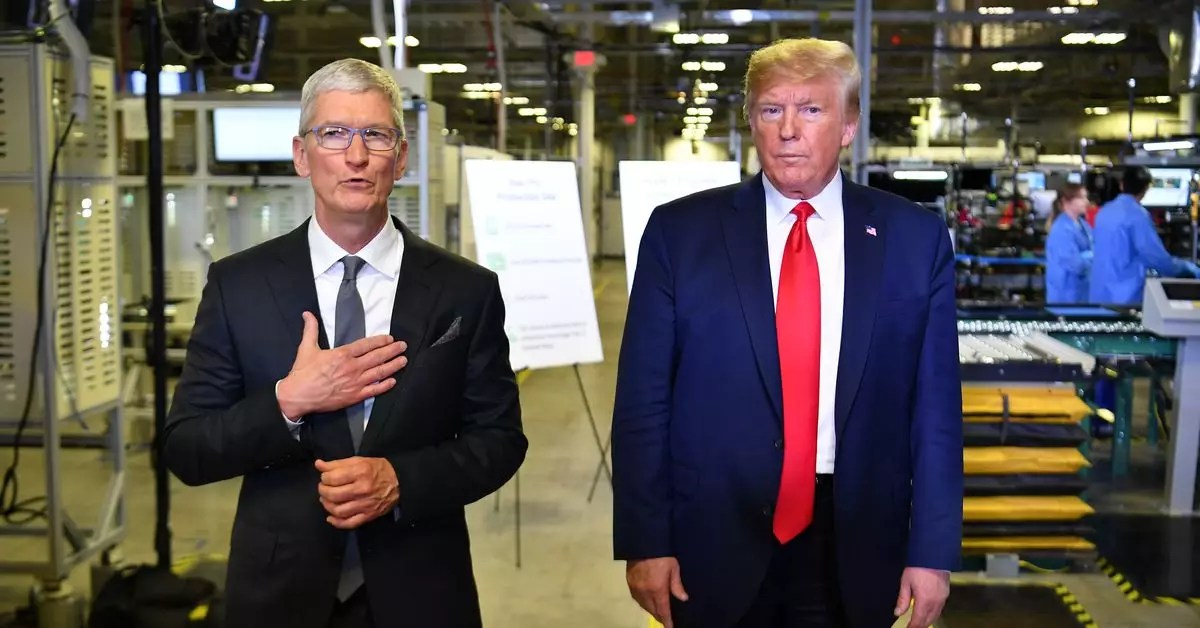In the intricate world of tech and politics, few figures have managed to strike the right balance quite like Tim Cook, the CEO of Apple. During Donald Trump’s first term as President, Cook succeeded where many in the tech industry floundered—he established a direct line of communication and influence. According to insights reported by the Wall Street Journal, Cook’s approach was marked by personal engagement rather than traditional lobbying methods. This shift in strategy has raised eyebrows and set a potential blueprint for other industry leaders seeking to carve out their own relationships in the convoluted landscape of American politics.
Cook’s success can largely be attributed to his ability to focus on areas of shared interest between Apple and the Trump administration. His direct appeals allowed him to shape significant policy changes, such as tax reforms and tariff adjustments that would ultimately benefit Apple. At a time when many tech giants struggled to gain favor in the political arena, Cook’s method was refreshingly straightforward yet profoundly effective. The simplicity of his strategy played a crucial role in fostering a dialogue that likely would have otherwise been bogged down by bureaucratic procedures.
Unlike some CEOs who may rely on a team of lobbyists and government relations experts, Cook opted for a more personal touch—engaging Trump directly over meals and phone calls. This hands-on approach not only humanized the interactions but also allowed for more focused discussions. By bringing just one key data point to each meeting, Cook ensured that conversations remained productive and aimed at concrete outcomes, making his advocacy feel less like a sales pitch and more like a collaborative effort.
As Cook’s relational blueprint becomes known, many corporate leaders in other sectors are looking to replicate his success. High-profile figures from Boeing and FedEx have reportedly sought to engage Trump directly, intrigued by the potential leverage of personal connections. This shift represents a broader trend where executives are increasingly eschewing traditional lobbying frameworks in favor of more intimate, direct engagements with political leaders.
However, the emphasis on charming political figures raises questions about the broader impassioned discussions around corporate responsibility and ethical engagements with government. While Cook’s strategy involved finding common ground, it suggests a willingness to sidestep certain truths—or, as shown in the Journal’s report, allowing Trump to take credit for projects that predated his administration. This complicity can appear as a pragmatic compromise, but it raises ethical considerations that leaders must navigate carefully.
The shifting dynamics between tech leaders and political powerhouses illustrate a notable evolution in corporate strategy that reflects a deeper intertwining of business interests and governance. Industry giants are now learning that the path to influence may not just be paved with lobbyists and policy reports but could also include a well-cultivated rapport with key decision-makers.
As corporate leaders adapt and experiment with new methods of engagement, one can only wonder how this will reshape the landscape of American politics and business in the years to come. Just as Cook demonstrated, navigating this intricate dance requires more than just strategy—it demands an understanding of individual personalities, a keen sense of timing, and an unwavering pursuit of common goals.


Leave a Reply